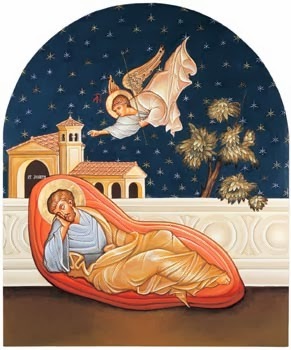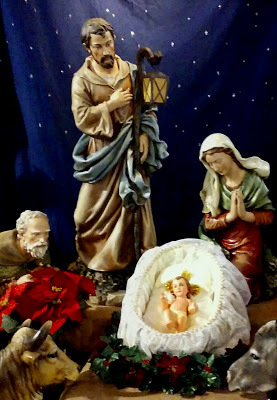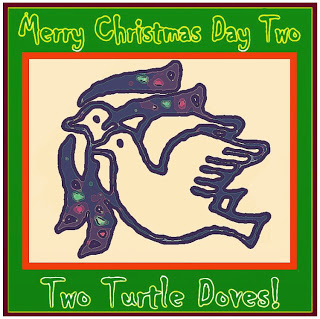John Janaro's Blog, page 135
January 1, 2020
God Became the Child of Mary
The year 2020 has begun. New year, new decade, but Jesus is the same yesterday, today, and forever.

"Mary is a mother who contemplates her child and shows him to every visitor. The figure of Mary makes us reflect on the great mystery that surrounded this young woman when God knocked on the door of her immaculate heart. Mary responded in complete obedience to the message of the angel who asked her to become the Mother of God. Her words, 'Behold I am the handmaid of the Lord; let it be to me according to your word' (Luke 1:38), show all of us how to abandon ourselves in faith to God’s will. By her 'fiat,' Mary became the mother of God’s Son, not losing but, thanks to him, consecrating her virginity. In her, we see the Mother of God who does not keep her Son only to herself, but invites everyone to obey his word and to put it into practice" (Pope Francis, Admirable Signum 7).


"Mary is a mother who contemplates her child and shows him to every visitor. The figure of Mary makes us reflect on the great mystery that surrounded this young woman when God knocked on the door of her immaculate heart. Mary responded in complete obedience to the message of the angel who asked her to become the Mother of God. Her words, 'Behold I am the handmaid of the Lord; let it be to me according to your word' (Luke 1:38), show all of us how to abandon ourselves in faith to God’s will. By her 'fiat,' Mary became the mother of God’s Son, not losing but, thanks to him, consecrating her virginity. In her, we see the Mother of God who does not keep her Son only to herself, but invites everyone to obey his word and to put it into practice" (Pope Francis, Admirable Signum 7).

Published on January 01, 2020 20:30
December 31, 2019
A White Tree in the Barren Woods
 This is a good view for the last day of 2019, which was such a hard year for me and for others in our local community.
This is a good view for the last day of 2019, which was such a hard year for me and for others in our local community.For me and my family, there were certainly joys as well as sorrows and struggles, but in everything there was a note of change. Change, even good change, is never easy for me. But especially loss and grief are different and harder than I ever realized.
Overall, I am grateful for all the good things of this year (and ultimately everything is "working for the good," so I pray that the Holy Spirit will enkindle and sustain that fundamental vitality of gratitude and joy that dwells - often secretly - in the depths of the Christian soul). Still, there is much that is difficult to process, or that simply must be endured. Thus I feel a bit bewildered and existentially "displaced" at the year's end. I'm sure I'm not the only one who is going through these kinds of emotions.
It's difficult to find words to express the significance of so much that has happened in these months. I am pushed beyond the limits of ordinary knowledge. People I loved and saw with my eyes and too often took for granted - above all my own father - have passed behind that "glass" through which things can only be seen darkly... and sometimes it is very dark indeed.
I guess I can say that it has brought me to a "new place in life," even if it's a place that sometimes looks so barren and dry, like a Winter that never ends. But, I tell myself, it’s just a new and rough stage in the journey of life (oh, that sounds so cliché, but still...). My faith promises to me that Winter will end, the trees will blossom, the White Tree will spread its canopy of leaves again. And so it will remain forever, when at last the turn of the seasons reaches its end.
I'm still searching for metaphors. Maybe it's because the darkness is just too much for me to bear.
It is too much. That is why God sent His Son into the world. "The light shines in the darkness, and the darkness has not overcome it" (John 1:5). The Word became flesh, born of the Virgin Mary, and took up His dwelling with us. He remains with us, living in the midst of the people He has gathered together (ekklesia, "church") to follow Him and be His witnesses to the whole world.
His presence is encountered through abundant signs and symbols, and especially through the mystery in which He makes them instruments of Himself: the sacraments. These are not like the metaphors I grasp at when I am lost in the dark woods. They do not come from my mind or my imagination. They are given to me.
He gives Himself in the sacraments. He is the Eucharist, present for me, offering Himself to me. I feel blind, powerless, dispossessed. But He still wants to be with me. When I have nothing, He is still "here," and He holds onto me though I know not where I am going in the days, months, and years ahead.
As I have said elsewhere, Jesus Himself is my hope. In my darkest obscurity, He finds me through His presence in the Church, through prayer and the sacraments. Lord, whatever you are doing with me, wherever you are leading me, I pray that I will never give up trusting in you.
"God is good. All the time." Happy New Year!
Published on December 31, 2019 11:36
December 29, 2019
Three Days in a Monastery Thirty Years Ago

As long as everyone is being retrospective about "decades," here's an old thing that takes me back three decades, to the last three days of 1989. These are some notes from a retreat I made at Holy Cross Abbey — the Cistercian monastery in Berryville, Virginia — on December 29, 30, and 31, 1989.
It was quite simple: the weekend was spent at the retreat house on the property of the monastery. Guests were fed, and an old monk was available for spiritual guidance insofar as anyone wished to receive it (and I recall having a good, down-to-earth meeting with him). The rest of the retreat was unscheduled, other than an open invitation to participate in all the liturgical offices of the monks, throughout the days and nights, in the abbey church.
I remember these three days of prayer and silence as being reflective, serious, and helpful regarding some important decisions I had to make at the time. Unfortunately, these notes don't shed much light on the decisions or the circumstances which, after thirty years, could use a little brightening up in my own mind. It's not until you're older that you realize how valuable a written journal can be for stirring up your own memories. I wish these pages were more useful to me in that regard.
I was a few days shy of turning 27 years old, which — even in these days of "extended adolescence" — usually signifies that a person is, finally, an adult. Yet I was still very much a dreamer, an abstracted academic, and (especially since that Summer) a person much taken up in my own imagination. I had written a small collection of poetry which I felt good about (only one of those poems I might still consider "passable" today). At the time, I had "literary sensibility on-the-brain."
I was far from finding my own voice, however. That is probably why these pages seem so affected to me now. It reads like I was trying to imitate Thomas Merton's journals (or even unconsciously plagiarizing from them, since I was strolling through the woods and fields of a Trappist monastery).
I don't know what to make of all this. But anyway, here it is:

This does show the manner in which I used to write in the old days, in long hand, direct from my mind onto the page, with much more legible handwriting than I have now. As far as I know, these are the original, unrevised pages. The ideas and images are alright, but they are strangely "polished" for notes. I had skill at drafting my thoughts quickly, but this lacks a sense of spontaneity, and gives little insight into what I was learning through the retreat or actually dealing with in my life at the time.
"What I want, what I thirst for, is to be alone"? Really? It seems like I was writing what I thought I was supposed to feel like — being an earnest and grave young man — after a weekend with the Trappists. If there was something real about this thirst for solitude, I don't remember it. I had no desire to enter the monastery. I don't know what I was getting at, and I can't help thinking that I was just trying to reassure myself that I had had a "deep" experience.
Perhaps I wanted to "want-to-be-alone" because, at the time, I felt very much alone. Maybe I was even a bit depressed (though I did not yet know anything about mental health in those days). I was in any case given to overusing metaphors in what were supposed to be my own retreat notes.
I might have been just pitching out themes and images for a poem that never got written.
I certainly was not settled in the direction of my life. Many of us in the academic world were adrift or lonely (or both) in those days. We were unevenly formed (at best). We lived very much in our heads. I suppose to some extent I still do.
Unlike the notes, the retreat was substantial. Perhaps I'm being unduly harsh about writing that doesn't sound that much different from what I churn out now. One never really does very well at understanding oneself (which is why writers need editors and people need... other people).
What is interesting is that 1990 proved to be a crucial year for me. In the first few weeks of the new decade, I met some new friends and the beginnings of a much more secure, much less lonely path on which to travel.
One of those friends, who I met for the first time shortly after this retreat, was a girl named Eileen.
Published on December 29, 2019 20:56
December 28, 2019
The Face of God

"For us God is not some abstract hypothesis;
He is not some stranger
who left the scene after the 'Big Bang.'
God has revealed Himself in Jesus Christ.
In the face of Jesus Christ we see the face of God.
In His words we hear God Himself speaking to us."
~Benedict XVI
Published on December 28, 2019 20:17
December 27, 2019
The Decade of The Washington Nationals
 Since we're all doing the "Decade Retrospective" thing in these days, I want to share my statistical doodling that I recently undertook in order to procrastinate from working pass a few leisurely moments. It pertains to the phenomenon of this past decade that my son and I will always be able to look back upon as bathed in the warm light of ultimate success. Moreover, it is a success that came at the end of the decade, just in time to rescue us from having to look back on these same numbers with cold cynicism.
Since we're all doing the "Decade Retrospective" thing in these days, I want to share my statistical doodling that I recently undertook in order to procrastinate from working pass a few leisurely moments. It pertains to the phenomenon of this past decade that my son and I will always be able to look back upon as bathed in the warm light of ultimate success. Moreover, it is a success that came at the end of the decade, just in time to rescue us from having to look back on these same numbers with cold cynicism.The 2010s were The Decade of The Washington Nationals.
For us as Nats baseball fans, literally one game (game 7 of the 2019 World Series) made the difference in our experience of this decade as being a thrill of victories rather than an agony of defeats. That doesn't seem to make sense, but ultimately sports are not about the exercise of reason in the exact manner of a science. They are about play. Within the "realm of the game" (admittedly minor in relation to other, much more important realms of life, but also a realm that has its own integrity) the "thrills" and "agonies" have their own significance, which we must not underestimate.
Players and their performances on the field are a big part of this, of course. This is the decade that began with Stephen Strasburg's 14-strikeout major league debut on June 8, 2010 and ended with Stephen Strasburg's winning the World Series MVP on October 31, 2019 (and going on to sign a long-term contract with the Nationals this past month — for us fans that means he's staying on our field for a long time). Ryan Zimmerman, a career Nat, played frequently injured during the decade, but made it all the way to being a clutch factor in the playoffs and World Series. Max Scherzer: all the great seasons, the two Cy Young awards, the strikeouts, the no-hitters, and... winning the World Series.
There was much that was memorable during all the seasons of the decade, even if four of them ended in first-round playoff disappointment. Pitchers like Jordan Zimmerman and Gio Gonzalez gave us great years, and then Jayson Werth — who played with the Nats from 2011-2017 — did so much to build the fighting spirit of the winning team they became two years after he retired. Werth also hit the game-winning home run back in 2012 that kept the Nats alive in their first playoff series (before this year, that was the top highlight of the Nats' post-season play).
Am I forgetting anybody?
Oh... there was that dude who hit lots of towering home runs and then decided to play for the Philadelphia Phillies... what was his name again?
Published on December 27, 2019 19:40
December 26, 2019
Christmas is a Season
Published on December 26, 2019 17:49
December 25, 2019
Merry Christmas 2019
Published on December 25, 2019 20:06
December 24, 2019
"He Comes to Save You"
"Be strong, fear not! Here is your God; he comes with vindication; with divine recompense he comes to save you."
Christmas Eve. The vigil approaches, when we will keep watch under the night sky. The Lord is near....
He comes as a child. He brings healing. He reveals the unconquerable power of God's love that sets us free.

Christmas Eve. The vigil approaches, when we will keep watch under the night sky. The Lord is near....
He comes as a child. He brings healing. He reveals the unconquerable power of God's love that sets us free.

Published on December 24, 2019 12:50
December 23, 2019
Joseph May Not Have Thought What We Think He Thought

Because this post never gets "old," I like to run it again from time to time, especially when we read the one text in the New Testament that gives us some idea of the perspective of St Joseph when he first found himself caught up in the events we are about to celebrate. Thus once again I present, for your reading (or rereading) consideration, this bloggy "digest" of some of my old undergraduate lecture material, entitled "Joseph May Not Have Thought What We Think He Thought."___________________________________________
Everyone is familiar with the Gospel reading from yesterday's liturgy for the Fourth Sunday of Advent. It was all about Jesus being conceived by the power of the Holy Spirit in the womb of the Blessed Virgin Mary... from the perspective of St. Joseph. We think we know what is going on in this passage, but perhaps we assume too much:
"When his mother Mary was betrothed to Joseph, but before they lived together, she was found with child through the Holy Spirit. Joseph her husband, since he was a righteous man, yet unwilling to expose her to shame, decided to divorce her quietly. Such was his intention when, behold, the angel of the Lord appeared to him in a dream and said, 'Joseph, son of David, do not be afraid to take Mary your wife into your home. For it is through the Holy Spirit that this child has been conceived in her. She will bear a son and you are to name him Jesus, because he will save his people from their sins'" (Matthew 1:18-21).Ah yes, that "touchy" little situation.
Thus we are introduced to St. Joseph, and the testimony of Divine Revelation to this greatest of saints after Mary herself is largely contained in these first two chapters of Matthew (along with some references in Luke 1-2). Indeed, this is one of his most important moments; it is the moment upon which his vocation is founded. What do we learn about him in this passage?
Perhaps it is something a little different from what we initially think. For a person like me, this story might enter into my mind and get mixed around and end up sounding something like this (note well -- the actual words of the Scripture are in bold type; the rest is JJ's imagination coloring in the details):
Joseph her husband, when he realized that Mary must of been... well... unfaithful to their betrothal (which really surprised him since Mary had been so completely, astonishingly, immaculately good up until then) since he was a righteous man, yet [YET?] unwilling to expose her to shame, (in other words he was "righteous" but he wasn't like "crazy righteous" -- the Law said an adulterous wife should be stoned to death [see Deuteronomy 22], but he decided to ignore the Law and let it slide because he was a nice guy,) decided to divorce her quietly. (Mary had this story about an angel and a miracle and the Holy Spirit, but as Joseph himself said in Franco Zeffirelli's movie Jesus of Nazareth [and he must have said it, because we saw it on TV], "That's too much for any man to believe!" But still, he was a nice guy so he was willing to hush things up and break it off quietly.) Such was his intention when, behold, the angel of the Lord appeared to him in a dream and said, "Joseph, son of David [why did he call him that?], do not be afraid to take Mary your wife into your home. [PERIOD! That means the angel finishes his sentence here. Then he takes a deep breath and continues with the next sentence...] For (in other words, after have taken his deep breath, the angel proceeds to explain to Joseph what really happened, setting the record straight that Mary was telling the truth after all) it is through the Holy Spirit that this child has been conceived in her. She will bear a son and you are to name him Jesus, because he will save his people from their sins." At which point Joseph goes <FACEPALM> "If I had known, O angel, that Mary was really bearing the Messiah, the Son of God, in her womb by the power of the Holy Spirit, I would never have 'divorced her quietly'! Oh no, I would have taken her into my home and taken upon myself the earthly responsibilities of fatherhood for... you know... God Incarnate...."Okay, JJ... enough snarkiness. What's the point? Well, the point here is that if I step back and examine what seems to be the common sense interpretation of this text, it starts to raise all sorts of problems. There's not a whole lot of bold type in that long paragraph. I have to make a lot of assumptions, which is not unreasonable since these assumptions are generally made even by theologians (generally, but not universally, and -- as we shall see -- there is good reason for a different reading).
The interpretation fills in details that are precisely not mentioned in the text, but that seem necessary to make sense of it. The thinking is that Joseph is divorcing Mary for infidelity, and he is assuming that her pregnancy is a result of that infidelity (maybe she tried to explain it and he didn't believe her, or maybe she said nothing because of humility, in which case he still must have been somewhat flustered). He is a "just man," so he's not interested in getting revenge against the perpetrator, nor does he want to "press charges" according to the Law, but he also has no intention of covering the whole matter up by taking her in as his wife and presenting himself as the child's father. Then the angel appears to him and tells him not to be afraid to marry Mary because she is innocent and the child has been conceived by a miracle. The child, in fact, is the Savior. Problem solved. The marriage is back on.
Problem solved? On closer inspection, maybe not. Actually we have several problems here. The underlying problem is that we interpret this whole event based on a presupposition that is not in the text. In fact, a closer look at the text reveals that our presupposition (that Joseph is divorcing Mary because he thinks she's pregnant by human agency) is not supported; indeed, the implications lead in another direction entirely.
What I'm presenting here is theological and exegetical opinion, which has been much more precisely expressed by theologians and biblical exegetes (such as, for example, John McHugh, in his fascinating book The Mother of Jesus in the New Testament [1975] and Giorgio Buccellati, longtime professor of Ancient Near Eastern studies at UCLA [see e.g. "The Prophetic Dimension of Joseph," Communio, Spring 2006] -- just so you know that my ramblings here are backed by scholarly heavyweights). Scott Hahn refers to the two opinions on this text as the Suspicion Theory (Joseph thinks Mary committed adultery until the angel reveals otherwise) and the Reverence Theory (which is... well, let's see). Scott himself doesn't "take sides" here, but (to my reading) he also leans in the direction of the latter theory (see The Gospel of Matthew, Ignatius Catholic Study Bible, p. 18).
That will have to suffice for scholarly "apparatus" in what is a decidedly non-scholarly blog post. JJ just wants to outline why he now sees this event in a different light, not only because it makes more sense, but also because St Joseph is his homeboy. (Really, I don't know where I'd be without him.)
Let's take a closer look at this text. Mary "was found with child through the Holy Spirit." What does this mean? Exactly what it says (also in the Greek). Before Joseph took Mary into his home, she was found with child through the Holy Spirit. Once again, note well that does not say that she was "found with child and claimed that the child was conceived by the Holy Spirit." We might assume that the point here is that Mary was "found with child" and that Matthew just adds the Holy Spirit parenthetically. Is this assumption warranted? Let's examine further and see if we really need these invisible parentheses.
Clearly, Mary is with child and Joseph wants to end the relationship. He has no choice but to divorce Mary, since the betrothal is already a binding legal commitment. But he doesn't want to "bring shame" upon her (stoning to death and all that), so he decides to do it "quietly." And all of these assumptions hinge on Joseph being a "just" or "righteous" man, which means that he is a man devoted to the Law (hence divorce) who is simultaneously a man willing to set the Law aside (hence "quietly").
Hmmmm.
 The quiet divorce is something of a head-scratcher. Our lectionary translation gives us something that is appropriately bumbling: "Joseph her husband, since he was a righteous man, yet unwilling to expose her to shame, decided to divorce her quietly." Since? Yet? He was righteous, but...? And while we're at it, let's look at this term that Matthew decides to toss in here: dikaios. This is Greek for the Hebrew saddiq. Such a title is not awarded lightly in the Scriptures. This is a profound and full sense of righteousness, such as is attributed to Noah and Abraham. This is the kind of "justice" out of which radical foundations can be made. Here is Joseph the Righteous.
The quiet divorce is something of a head-scratcher. Our lectionary translation gives us something that is appropriately bumbling: "Joseph her husband, since he was a righteous man, yet unwilling to expose her to shame, decided to divorce her quietly." Since? Yet? He was righteous, but...? And while we're at it, let's look at this term that Matthew decides to toss in here: dikaios. This is Greek for the Hebrew saddiq. Such a title is not awarded lightly in the Scriptures. This is a profound and full sense of righteousness, such as is attributed to Noah and Abraham. This is the kind of "justice" out of which radical foundations can be made. Here is Joseph the Righteous.And Matthew has introduced this term to explain to us (while also confusing us further) the reason why Joseph decided to be kind and merciful to his adulterous wife? Assuming that there's some wiggle room in the Law for this kind of arrangement (and we all assume this, of course), it would seem that a decent man could take this road without much heroic virtue. It hardly requires the righteousness of Noah or Abraham to walk away from an unfaithful spouse, without obligations and with a spotless reputation. The betrothed woman is allowed to live. We assume (again) that the "quiet" will succeed in smoothing over the situation for everybody, whereas in fact it refers only to refraining from filing a public charge. In such circumstances, the woman is still socially disgraced and even cast out of home and family, shamed for the rest of her life. It's not like she can go abroad for a year, have the baby, and then come back with nobody knowing anything about it. This is not the Hamptons. This is a Palestinian village. In 4 b.c. Everybody in the village knows everything. As for Joseph? Not his problem anymore.
But, Matthew tells us, Joseph is not the average man who wants to cut his losses and get out of town. He is saddiq. He is just. He is righteous. The angel in the dream does not rebuke him nor cause some great moral conversion. Joseph is already the quintessential steadfast man. Still, given what we assume to be his understanding, he's not doing anything "wrong." (Or is he being shifty with the Law? Isn't there a better way? Oh gosh what a mixup!)
What's wrong with this picture?
Perhaps we can keep all these human assumptions (as many, but not all, church fathers and many, but not all, interpreters have) and still squeeze it all together and make it fit. It's all a big misunderstanding that the angel clears up, to our great relief, by telling Joseph the truth.
If only Joseph had known from the start that Mary had conceived by the Holy Spirit, then it would have been.... ? What "would it have been"? What if?
Consider this possibility: What if Mary told Joseph about the Annunciation, and Joseph did believe her? What if Joseph, the righteous man, totally, totally believed her?
Here also, we are assuming (or hypothesizing) something that the text doesn't come right out and state. But why do we assume that it didn't happen this way? There is nothing implausible about this communication between these particularly extraordinary betrothed spouses. I would think that Joseph would be the first person she would tell. What we do know of Mary from the Gospels indicates that she was humble and obedient, yes, but not timid. She was also practical.
This was something Joseph needed to know. I see no reason why Mary would not have told him the whole thing, right away.
And how far have we really departed from the text in "assuming" this? Matthew 1:18 says "she was found with child through the Holy Spirit." Matthew is giving us Joseph's perspective here (is any other person mentioned?). So who "found" out that she was "with child"? Joseph. And how did he find out? Mary told him. Is it possible that what Joseph "found" was that Mary was "with child through the Holy Spirit"?
"But, but..." we might say, "if he had known, there wouldn't have been any thought of divorce, right?"
On the contrary. In these circumstances we have precisely what we need to make sense of the "quiet 'divorce' of the 'just man'" -- this is where lots of pieces fall into place in a way that I find compelling. It is precisely at this point that Matthew tells us that Joseph is saddiq, that he is righteous with that sense of awe and wonder at the mystery of God; in fact he is one in a million, the man to whom the Lord had already entrusted His most magnificent creation: the Immaculate Virgin Mary. But what has Mary just told him? She has been "overshadowed" by the Most High and has now become, in a new way, the dwelling place of the Holy One. (When Mary asked the angel, "How?" in Luke 1, she got a very clear answer.) Both Mary and Joseph recognized in these terms the references to the Shekinah, the Glory of God who descended upon the Ark of the Covenant, who dwelt in the Holy of Holies in the temple.
Only those called specifically by God to the Levitical priesthood were allowed to pass beyond the veil and enter the Holy of Holies. But what was this that had happened to Mary? The Glory dwells in her. It is precisely because Joseph is "Just" according to God's own heart that he would never presume that a human betrothal gave him the right to take the New Ark of the Covenant by his own authority into his home. (I know, I'm coordinating Matthew and Luke here, but I'm one of these people who actually believes that, whatever literary genres are being employed in these narratives, their purpose is to convey to us stuff that really happened.)
Joseph learns that Mary is "with child through the Holy Spirit" and that she has received a new, divine vocation. But he has had no revelation from God, no new vocation that corresponds with Mary's. What can he do? He is a "righteous man" and is able to understand that Mary has become a bearer of God's Glory. Surely, the Lord will make His will known for Mary and this extraordinary child. The Lord will assure that Mary is protected, no doubt by someone worthier than Joseph himself. The only role Joseph sees for himself here is to release Mary from the obligations of the betrothal (yes, the word for "divorce" can be understood in this way) to make room for whomever God chooses. Of course, Joseph will do it "quietly," secretly, because it would be manifestly more than unjust to expose Mary to shame. It would be wicked. "Joseph, since he was a righteous man" (1:19) would never do such a thing. He will release her right away, and keep her secret to himself.
For his own part, Joseph is filled with awe and humility. He is full of that eminently righteous gift which is the fear of the Lord. No doubt he wonders about many things, and is probably confused and "afraid" in the emotional sense. But above all, he is surrendering Mary to the mystery and the freedom of God's plan.
This is his intention when the angel appears. And here more things start to make sense. The angel says to him, "Do not be afraid to take Mary your wife into your home." The "fear" indicated here is the kind that the human person has before the mystery of God. The "Suspicion Theory" has no way to explain this fear. If Joseph thinks Mary's pregnancy is ordinary, it's hard to see what he would be "afraid" of even in a purely human sense. He would be opposed to taking an adulteress into his house, not for any reasons of fear, much less the fear of the presence of God. He would be concerned for her dismal future. He would have no fear about himself; he has done the right thing.
But the angel invokes that fear in the presence of God and relates it directly to Joseph taking Mary into his home. That would make perfect sense if Mary in fact has the presence of God within her in a wholly new and unimaginable way.
But how do we account for the angel giving Joseph the news of Mary's miraculous conception in a way that seems "fresh" if he already knows about it? Isn't there a divinely inspired PERIOD that divides 1:20? "Do not be afraid to take Mary your wife into your home. For it is through the Holy Spirit that this child has been conceived in her." These two sentences do sound like the angel is relieving Joseph's "fear" by informing him that Mary's child is in fact of the Holy Spirit. But we've seen that this fact is the only meaningful reason for Joseph's fear in the first place.
Here's where we must realize the limitations of translation. The New Testament was written in the common Greek of the first century, with no word spacing or punctuation. Many terms that have various possible renderings get standardized by translators for a variety of reasons. Frankly I'm not a New Testament scholar or a Greek scholar. But here I'm relying on John McHugh (see above) who is both. McHugh says that it is legitimate to read this verse in a different way, pulling out the punctuation that isn't there in the first place and using some unwieldy clauses which don't sound great in English but render the sense more accurately.
The result is that the angel's words to Joseph actually emphasize that Joseph's knowledge of the miracle is the cause of his fear. What we should read here goes something like this: Do not be afraid to take Mary your wife into your home on account of the fact that it is through the Holy Spirit that this child has been conceived in her. Now that makes sense.
 And there is a hint here too of what the angel's real purpose is in this vision: "Joseph, son of David..." he says. It's interesting that this narrative begins at verse 18. The first 17 verses of Matthew's gospel are a genealogy from Abraham through David (the King to whom the promise of God is given) to Jesus. When I see the genealogies in the Scriptures, I am tempted to zone out. I am even tempted to open Matthew's gospel and just start at verse 18. But this genealogy does catch my attention because after all these carefully recorded names we arrive at "Jacob the father of Joseph the husband of Mary, of whom Jesus was born" (1:16).
And there is a hint here too of what the angel's real purpose is in this vision: "Joseph, son of David..." he says. It's interesting that this narrative begins at verse 18. The first 17 verses of Matthew's gospel are a genealogy from Abraham through David (the King to whom the promise of God is given) to Jesus. When I see the genealogies in the Scriptures, I am tempted to zone out. I am even tempted to open Matthew's gospel and just start at verse 18. But this genealogy does catch my attention because after all these carefully recorded names we arrive at "Jacob the father of Joseph the husband of Mary, of whom Jesus was born" (1:16).Wait! If Joseph is not Jesus's biological father, then what good is the genealogy? In fact, it's a lot of good, and it sets the stage and indicates the focus of the narrative that follows. Kingly inheritance passes from father to son in the Hebrew tradition. Mary's lineage has no legal significance and it is the legal claim to be a descendant of David that is necessary for Jesus to inherit the Davidic kingship and fulfill the promise.
But there was no human father! The inheritance can only be handed on if a descendant of David steps in and acts as father to Jesus (we say that Joseph "adopts" Him, but I'm not sure that we have an entirely adequate term to describe the sui generis role that Joseph is called to play).
"She will bear a son and you are to name him Jesus" (1:21). Now we know what this angelic visit is all about. The angel is giving Joseph his specific vocation; he is conveying God's authorization (indeed His command) that Joseph enter into a unique service to this new Shekinah, this new presence of God in the world: that he take his wife into his home without fear, because he, Joseph, is the one called by God to take on this responsibility. And he is called to this because he is a "son of David" and he therefore passes on the earthly line of the Messianic king to Mary's son, to whom he gives the name of Jesus.
Personally, I'm convinced. This has gotta be it. Remember that Scott Hahn called this the Reverence Theory, and I think we understand why. It's simple. It makes everything fit together. It's consistent with the details Matthew gives us and fits better into the context. It explains Matthew's statement that from the beginning Mary was "found to be with child through the Holy Spirit." It accounts eminently and in every respect for Joseph's title of saddiq, right in the place where Matthew introduces it (without resorting to casuistry about the Law, or a murky sense of what Joseph was up to or what human problem he was afraid of, or having to posit this odd, tense, and mistrustful beginning of the Holy Family).
The "Reverence Theory" corresponds to the singular sanctity of the man, St. Joseph -- always obedient, always steadfast, always following God's will and trusting in His wisdom. That is the St. Joseph I know, and I have no reason to believe he was ever otherwise.
Published on December 23, 2019 17:07
December 22, 2019
Frosty Early Morning

This work is called Frosty Early Morning, December 22 (photo-based Digital Art).
The picture really does convey the look and the "feel" of things at 8:00 AM today. It was a sharp cutting cold with ice on car windows.
Published on December 22, 2019 15:45





